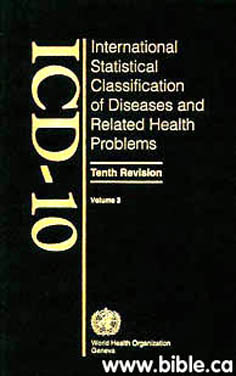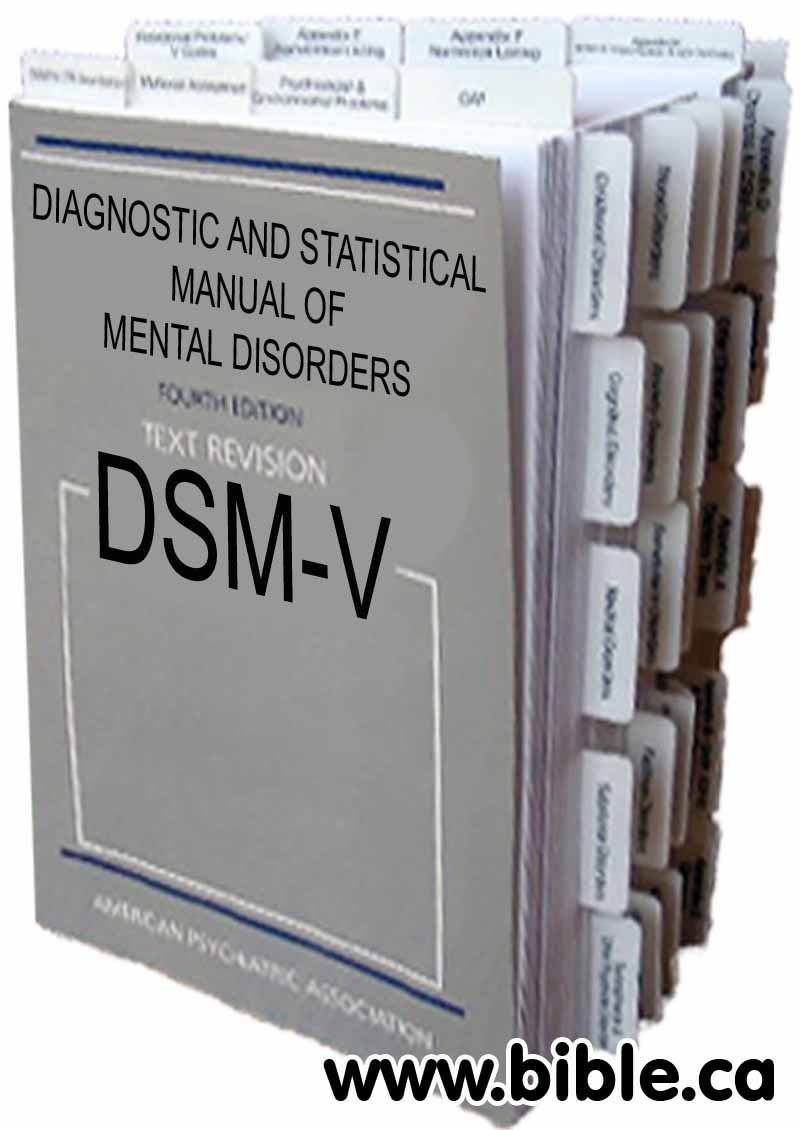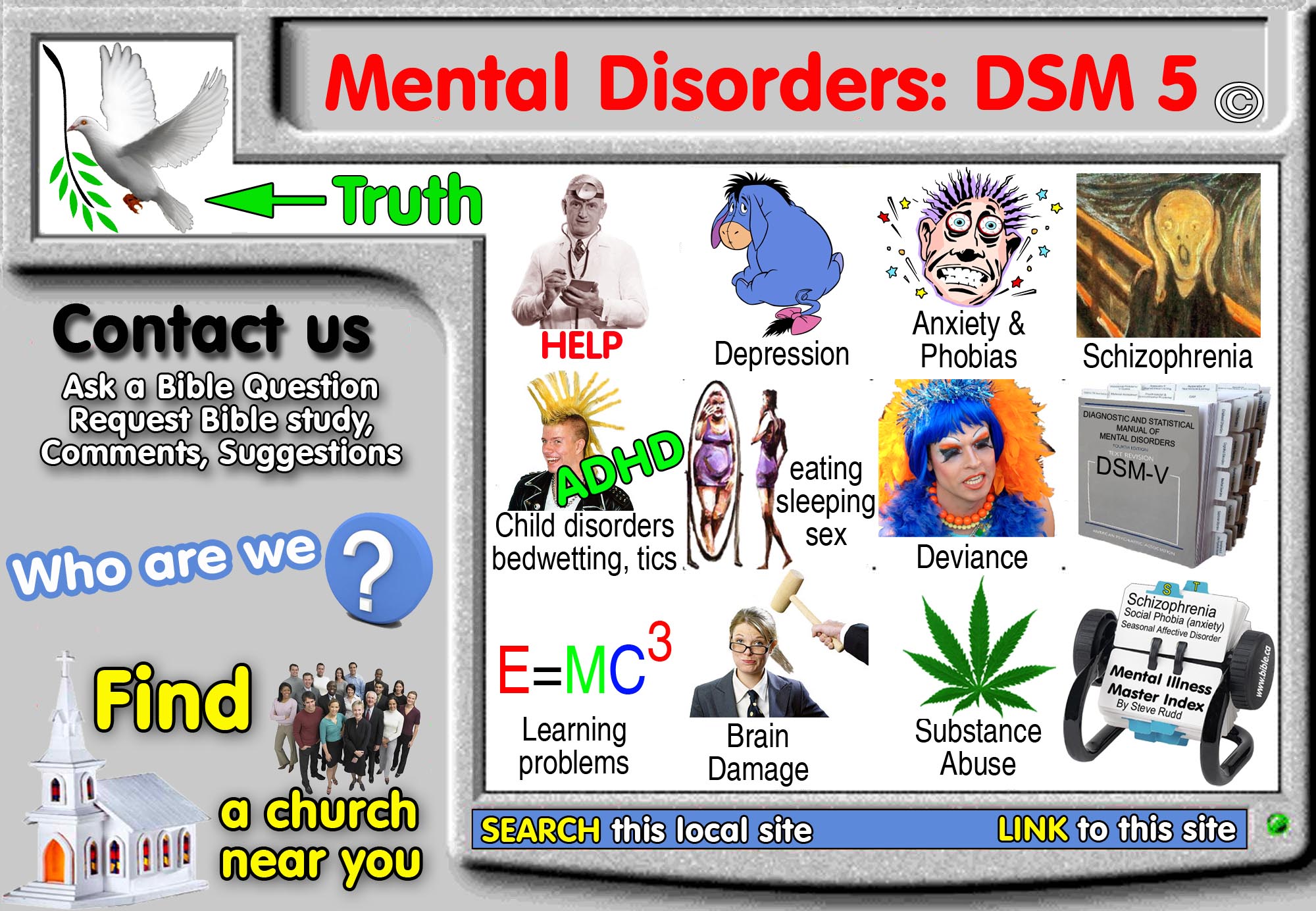DSM-IV, DSM-5, ICD-10: Brain Damage and Mental Retardation
"There are, of course, people who are mentally ill. If I were to raise a crowbar and bring it down squarely across your head, you would have-literally-mental illness; there would be no question about it. You would have an illness caused by physical, organic brain damage. Quite legitimately you could be declared "ill." In every genuine sense of the term you would be mentally ill. Some people whose brains have been injured by toxic substances have mental illness." (The Big Umbrella, Lecture, Jay Adams)
|
|
|||
|
Brain Damage, Mental Retardation F01-F09 Mental disorders due to known physiological conditions There are a number of genuine medical conditions that can trigger symptoms that resemble mental illness and alter cognitive abilities. |
|||
|
|
|||
|
DSM-IV, DSM-5, ICD-10 International Classifications of Diseases Diagnostic and Statistical Manual |
|||
Introduction:
- Mental retardation is not mental illness. It is either a chromosomal error, like in Down syndrome, or some other physical problem with the brain.
- Both Down syndrome and dementia are medically testable "mental disorders" but neither would be seen as "mentally ill".
- Genetic chromosomal makeup at the time of conception can have a great impact on cognitive abilities.
- "Although the organic and functional distinction was removed from the DSM, the disorders that were traditionally labeled as organic have remained. Dementia, delirium, and amnestic disorders were relabeled as the cognitive mental disorders. These disorders are often diagnosed in such a way as to indicate the physical illness that exists as the underlying cause. Examples include dementia of the Alzheimer's type, vascular dementia, and amnestic disorder due to a general medical condition. Also included in DSM are disorders with a known substance-based etiology. Examples include substance intoxication, substance withdrawal, and substance induced sexual dsysfunction. A defining factor in these disorders is the existence of a known biological etiology." (The Journal of mind and behavior, Guy A. Boysen, v28, p 157-173)
- Physical trauma to the human body can change cognitive abilities and memory (amnesia), but not basic personality.
- A drunken or stoned mother while fetus inside her womb can induce fetal alcohol syndrome which can impair cognitive abilities.
- Physical trauma at birth like cerebral palsy can impair cognitive abilities.
- Brain injury from a car accident can trigger a chronic amnesia where the person never remembers anything about their spouse after 40 years. However, it is important to note that basic personality remains intact even in cases of complete amnesia. "Mental disorder" can simply mean an impaired cognitive ability apart from depression, anxiety, paranoia and schizophrenia. For example, getting hit on the head can cause a severe change in mental abilities but it doesn't change personality.
- Dietary and nutrient deficiency (starvation, neglect) can damage the body and impact cognitive abilities.
- Generally, physical problems impair the ability of the person to function, like dementia without depression, anxiety, paranoia and schizophrenia.
- The DSM-5 says that physical conditions can trigger depression, anxiety, paranoia and schizophrenia like symptoms. The problem with this is that it is possible for the human mind to change the body and make it sick. This is well documented.
- "Virtually any psychiatric presentation can be caused by a general medical condition. DSM-IV-TR describes 10 Disorders Due to a General Medical Condition based on the predominant presenting symptoms. These include Catatonic Disorder, Personality Change, Delirium, Dementia, Amnestic Disorder, Psychotic Disorder, Mood Disorder, Anxiety Disorder, Sexual Dysfunction, and Sleep Disorder ... all Due to a General Medical Condition. For presentations predominated by other symptoms (e.g., dissociation), Mental Disorder Not Otherwise Specified Due to a General Medical Condition should be indicated." (DSM-IV-TR Guidebook, 2004 AD, p 90)
- The DSM-5 fails to take into account the human spirit as an etiology of a differential diagnosis. The mind comprehends the impairment caused through substance abuse and the impact such "handicap" will have on the future of their life. The understanding that they have "screwed up their own life permanently" may lead to anxiety or depression. This anxiety or depression is not caused by the physical illness, but rather the mind understanding how the self-inflicted brain damage will change their life for the worse, which in turn makes them sad (depressed) and upset (anxious).
- It is well documented that the mind can trigger illnesses in the body. Most "biologic psychiatrists" reject the existence of the spirit in distinction from the body. They view man as nothing more than chemicals. When they encounter a physically sick person with a mental illness, they assume the physical illness led to the depression, anxiety, paranoia and schizophrenia, when in fact the opposite may be true. It may be that the depression, anxiety, paranoia and schizophrenia caused the physical illness.
- Here is the current thinking of "biologic psychiatrists" who view man as nothing more than a pile of chemicals devoid of spirit and soul or a distinct mind: "The increased use of biological therapies in psychiatry has resulted in a parallel, enhanced interest in the application of laboratory and diagnostic test evaluations for psychiatric patients. The reasons for this growing interest include an expanding awareness of physical conditions that can produce psychiatric symptoms and the need to use the laboratory to monitor certain psychopharmaco-logical interventions." (Textbook of Clinical Psychiatry, Hales, Yudofsky, 2003 AD, p 219)
- "There are, of course, people who are mentally ill. If I were to raise a crowbar and bring it down squarely across your head, you would have-literally-mental illness; there would be no question about it. You would have an illness caused by physical, organic brain damage. Quite legitimately you could be declared "ill." In every genuine sense of the term you would be mentally ill. Some people whose brains have been injured by toxic substances have mental illness." (The Big Umbrella, Lecture, Jay Adams)
Conclusion:
- It is important to understand the broad, all inclusive nature of the definition of a "mental disorder" in modern psychiatry. Mental retardation and dementia are not something that requires counseling or drugs.
- Psychiatry today is dominated by "biologic psychiatrists" who reject the existence of the spirit in distinction from the body. The idea that a known and observable physical medical problem can trigger depression, anxiety, paranoia and schizophrenia is foundational to their "man as nothing more than chemicals" way of thinking.
- It is also a matter of scientific fact that the mind (the spirit) can trigger physical changes in the body. The big mistake psychiatrists make is failing to question if the behaviours of depression, anxiety, paranoia and schizophrenia triggered the physical problem in the body, rather than the other way around.
|
DSM-IV, DSM-5, ICD-10: Brain Damage and Mental Retardation |
F01-F09 Mental disorders due to known physiological conditions (DSM-5 and ICD-10)
F01 Vascular dementia
F01.0 Vascular dementia of acute onset
F01.1 Multi-infarct dementia
F01.2 Subcortical vascular dementia
F01.3 Mixed cortical and subcortical vascular dementia
F01.8 Other vascular dementia
F01.9 Vascular dementia, unspecified
F03 Unspecified dementia
F04 Organic amnesic syndrome, not induced by alcohol and other psychoactive substances
F05 Delirium, not induced by alcohol and other psychoactive substances
F05.0 Delirium not superimposed on dementia, so described
F05.1 Delirium superimposed on dementia
F05.8 Other delirium
F05.9 Delirium, unspecified
F06 Other mental disorders due to brain damage and dysfunction and to physical disease
F06.0 Organic hallucinosis
F06.1 Organic catatonic disorder
F06.2 Organic delusional [schizophrenia-like] disorder
F06.3 Organic mood [affective] disorders
F06.4 Organic anxiety disorder
F06.5 Organic dissociative disorder
F06.6 Organic emotionally labile [asthenic] disorder
F06.7 Mild cognitive disorder
F06.8 Other specified mental disorders due to brain damage and dysfunction and to physical disease
F06.9 Unspecified mental disorder due to brain damage and dysfunction and to physical disease
F07 Personality and behavioral disorders due to brain disease, damage, and dysfunction
F07.0 Organic personality disorder
F07.1 Postencephalitic syndrome
F07.2 Postconcussional syndrome
F07.8 Other organic personality and behavioral disorders due to brain disease, damage, and dysfunction
F07.9 Unspecified organic personality and behavioral disorder due to brain disease, damage, and dysfunction
F09 Unspecified organic or symptomatic mental disorder
F70-F79 Mental retardation (DSM-5 and ICD-10)
F70 Mild mental retardation
F71 Moderate mental retardation
F72 Severe mental retardation
F73 Profound mental retardation
F78 Other mental retardation
F79 Unspecified mental retardation
By Steve Rudd: Contact the author for comments, input or corrections.
Send us your story about your experience with modern Psychiatry




